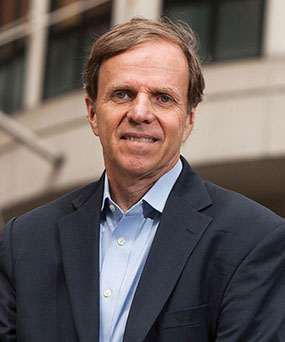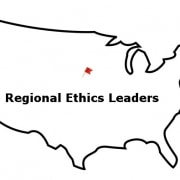Featured Ethics [and Human Rights] Scholar for April: Mike Posner
 Interview with Mike Posner, Jerome Kohlberg Professor of Ethics and Finance and Director for the Center of Business and Human Rights at NYU Stern School of Business
Interview with Mike Posner, Jerome Kohlberg Professor of Ethics and Finance and Director for the Center of Business and Human Rights at NYU Stern School of Business
What are your main areas of research/work?
When we launched the Center in 2013, we sought to pioneer new ways of investigating business practices at the industry level. Our methodology prioritizes interview-based research with business leaders and other stakeholders, combined with documentary evidence, policy and data analysis, and visualization.
How does strengthening human rights help reduce ethical misconduct in companies?
To date, most approaches to address human rights or sustainability in business have focused on what happens within the four walls of the firm. They focus on the activities of individual managers to improve company practices or corporate financial contributions to improve the environment, women’s empowerment, or public health. We are very focused on how large global companies make money, their business models for doing so, and the human rights risks in their industry that accompany that model.
Corporate Leadership is essential for a company to successfully integrate human rights and sustainability practices into its core operations. Paul Polman at Unilever is an excellent example of the influence a strong CEO can have in this respect. However, from the beginning, our premise has been that firm-level approaches are necessary but insufficient, and that durable progress in protecting the most vulnerable people will require companies within each industry to help develop and then abide by common human rights standards. In 2017, we are doubling down on this approach and expanding the ways we advocate for the implementation of human rights standards and metrics at an industry level.
What are the major impediments to improving organizational ethics that you see in your work?
One of the biggest challenges and also biggest opportunities is to create reliable metrics and indicators to assess corporate human rights performance. A number of ratings and other firms work to evaluate what are termed ESG assessments. The environmental and governance aspects are now being reported on quite actively. The S, the labor and human rights component, is still very weak, and company performance as opposed to promises and procedures are not being effectively measured. Improving the measurement of company performance on human rights is a priority area for us going forward.
We also see the need to balance the financial responsibilities of global companies with the responsibilities of other stakeholders. When we studied Bangladesh’s garment manufacturing factories we realized the overwhelming nature of what needs to be invested in that country to create safe factories for the almost 5 million garment workers in that country. The 200 brands and retailers sourcing from Bangladesh can’t be expected to underwrite all of the costs on their own. Thus, through an initiative of the World Economic Forum we developed a model of “shared responsibility.” Advocates for bringing together global and local corporations, governments, civil society and the international development banks and philanthropy to work together to share the costs.
Talk about Business and Human Rights – From Principles to Practice. How is the book being used? How can businesses use this book to enhance their culture?
It is the first comprehensive and interdisciplinary textbook that addresses the Business and Human Rights issues. It examines the regulatory framework that grounds the business and human rights debate and highlights the business and legal challenges faced by companies and stakeholders in improving respect for human rights.
It offers a comprehensive overview of the biggest issues in the field written by experts and practitioners. It also uses supporting case studies to demonstrate how corporations have tackled these issues. As a result, it serves as a reference not only to students but also to senior company officials and CEOs that can be used in the classroom and boardroom alike.
If you could only highlight one paper or research finding (or piece of work that you’ve been involved with, aside from the textbook) that relates to business and human rights, what would it be and why?
Given the influence of investors and consumers, I would point to our report on investment, “Putting the S in ESG” as an important research product.
How can companies make supply chains more ethical?
Our own work, and that of peers such as Richard Locke, finds that the safest supply chains are those where suppliers and buyers have had long business relationships, experience a consistent and steady flow of orders and transparency whereby the buyers understand the relationships the suppliers have with any subcontracting factories.
Tell us about one of your current or future projects.
Aside from the industry specific studies I’ve already talked about, we, in collaboration with the World Economic Forum, are looking at complexities in the ICT sector. I am co-chairing a two-year initiative examining the governance models and responsibilities of the largest Internet companies in managing their algorithms and filters in a way that will minimize false information, political propaganda, and extremist content. Through this initiative we also will seek to apply lessons learned from the internet sector to the governance models for other new technologies such as artificial intelligence, robotics or biotechnology.
If you could give one piece of human rights advice to companies, what would it be?
I would encourage CEOs and other senior business leaders to take a critical look at their operations and those of their suppliers to understand where their business models are leading to increased risks of human rights problems. Once they have determined risk they should work with their industry peers and other stakeholders to develop ways to mitigate those risks. The biggest challenges and opportunities lie in identifying the real risks at an operational level and the building industry wide responses based on common standards and metrics.
If you could give one piece of human rights advice to individuals, what would it be?
More than ever, consumers have access to a wealth of information about the companies from whom they buy their goods and utilize their services. Consumers should have the information they need to be in a position to reward the best and most sustainable companies with their purchases. If consumers are able to do so, companies will be much more likely to respond by adjusting their business practices in what should become a race to the top.
Featured Video:
Featured Academic Article:
“Shared responsibility: A new paradigm for supply chains,” World Economic Forum Global Agenda Council on Human Rights, November 2015.
Featured Popular Article:
“The World Economic Forum is treating fake news as an urgent matter of global human rights,” Quartz, January 25, 2017.







